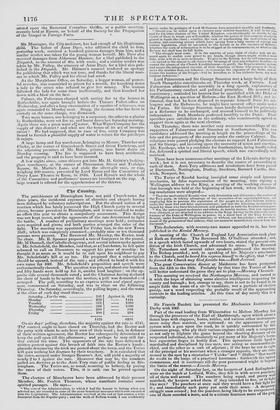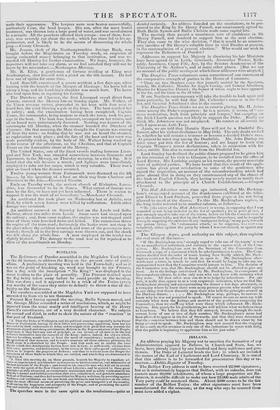Sir Francis Burdett has presented the Mechanics Institution of Derby
with 100/.
Part of the road leading from Whissendine to Melton Mowbry lies through the preserves of the Earl of Harbbrougb, upon which about a dozen boys with clappers, horns, rattles, and various other instruments more noisy than musical, are stationed : on the appearance of any person with a gun upon the road, he is quickly surrounded by this clamorous group, who ply their various engines with such a vengeance as not only to frighten the game beyond the shooting distance of the suspected individual, but absolutely to put many of his Majesty's harm- less equestrian lieges in bodily fear. This uproarious little bgrid is marshalled and disciplined by two men, one acting as commander:in- chief, and the other as a sort of adjutant ; if the boys be not in sight of the principal or his assistant when a stranger appears, they are sum- moned to the spot by a stentorian " Yoicks " and " Halloo" that would do credit to the lungs of a practised huntsman: forthwith the uproar commences, and it continues till the poor persecuted wight is beyond the limits of the manor.—Lincola Mercury. On the night of Saturday last, as the keepers of Lord Bolingbroke were on the watch at Lediard, Wilts, they fell in with seven poachers, all of them well armed. The numbers being equal, and pretty well matched, the keepers asked them if they intended to fire, or to fight like men ? The poachers at once said they would have a fair fight for it ; and immediately each party put aside their arms. A desperate struggle soon ensued ; but the poachers being likely to be overpowered, one of them sounded a born, and in a minute fourteen more of the gal made their appearance. The keepers were now beaten unmercifully, particularly Coxe, the head keeper. His son, after the most brutal treatment, was thrown into a large pond of water, and was saved almost by a miracle. All the poachers effected their escape : one of them, how- ever, was severely cut about the neck ; which has since led to his up. prehension, and is likely to be the means of discovering the whole gang.— County Chronicle.
Mr. Jenson, clerk of the Northamptonshire Savings Bank, was brought before the Magistrates on Tuesday week, on suspicion of having embezzled money belonging to that institution, and was re- manded till Monday for finther examination. We hope, however, the depositors will not take any alarm, as we feel satisfied they will not be losers by his misconduct —Northampton Mercury.
Mr. R. Eliot, a gentleman of fortune residing at Eling near Southampton, shot himself with a pistol on the 6th instant. He had been out of spirits for some time.
Lord Rancliffe experienced a severe accident a few days ago, when hunting with the hounds of the Alarquis of Hastings : his horse fell in taking a leap, and his Lordship's shoulder was much hurt. The horse also trod upon him, in regaining his footing.
The Dutchess of Clarence, the first Liverpool vessel direct from Canton, entered the Mersey late on Sunday night. Mr. Walker, of the Vixen revenue cutter, proceeded in his boat with four men to board her, the wind blowing a gale at the time. The boat reached her in safety; and, the examination having been completed, Captain Evans, the commander, being anxious to reach the town, took his pas- sage in the boat. The boat was, however, swamped on her return, and all on board were unfortunately drowned. Nothing was known of the catastrophe till Monday, when the steamer boarded the Dutehess of Clarence. On that morning, the Mate thought the Captain was coining off from the town : on finding that he was not on board the steamer, an explanation took place ; and the fate of the boat and her crew was made painfully evident, by the body of Mr. Walker being washed up in the course of the afternoon, on the Cheshire, and that of Captain Evans on the Lancashire shore of the Mersey.
The United States, one of the finest vessels trading between Liver- pool and New York, was stranded somewhere between Seacombe and Egremont, in the Mersey, on Thursday morning, in a thick fog. It is feared that she will become a wreck ; and lighters were immediately employed to take out her cargo, which is very valuable. There was a pilot on board when the disaster occurred.
Twelve young women from Portsmouth were drowned on the 4th instalit, by the upsetting of a boat on their way from Chatham and Sheerness to the Isis.—Greenwich Gazette.
Early on Tuesday week, the ancient church of Rivington, Lanca- shire, was discovered to be in flames. What extent of damage was done by the fire we have not yet been informed. There is reason to suppose it was the work of an incendiary."—Manchcster Chronicle.
An accidental fire took place on Wednesday last at Anlahy, near Hull, by which seven horses were killed by suffocation. Little other damage was sustained.
An accident occurred on Saturday last on the Leeds and Selby Railway, about two miles front Leeds. Some cows bad strayed upon the railway ; and, from smile neglect, the engine was not stopped until three of them were knocked down and killed. The concussion threw the engine off the train-road ; fortunately the banks were not steep in the place where the accident occurred, and none of the passengers were injured ; though all in the first carriage were thrown out, and the shock was felt along the whole line. A man employed in the tender was slightly bruised. The damage to the road was so far repaired as to allow of the usual transit on Monday.





















 Previous page
Previous page